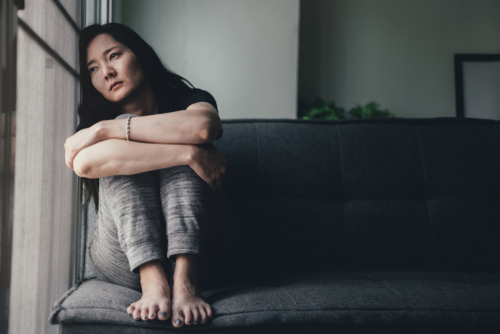Occasional feelings of isolation, fear, panic, and uncertainty are natural responses to stressful situations. However, these emotional reactions are far more intense and take a greater emotional toll on individuals with anxiety disorder.
While you may feel like there’s nothing you can do to control the current situation and escape the feelings of fear and panic, you should know that you aren’t alone. And, know this -many of us are feeling uncomfortable – trying to stay optimistic – fluctuating between looking for the silver lining and being downright pissed at the current situation and how it is accepting our families, jobs, etc. The article below was not written specifically for dealing with the COVID-19 virus however you may feel that it has some good information and suggestions that can help.

Being human is a process, not a problem, and reaching out to a relationship coach online can help you take the first step towards achieving a balanced state of mind. You are not the problem and the feelings are important to acknowledge and process. Read on to learn how to cope with anxiety during times of crisis. What Is An Anxiety Crisis?
We all experience feelings of fear, worry, and anxiety from time to time. These are natural, fight or flight responses to dangerous or stressful situations. However, the feelings of fear and impending danger can be significantly more frequent and pronounced if you are struggling with an anxiety disorder.
In times of crisis, whether personal or collective, an intense sense of panic and fatigue can severely impede your ability to think and function in our daily lives. This is especially true in situations where you are forced to isolate and spend extended periods of time without meaningful connections with others.
Why Do I Have Anxiety?
While being anxious in stressful circumstances is a completely natural thing, the causes of anxiety disorders aren’t entirely always clear. Nevertheless, the following factors seem to play a role in triggering severe anxiety:
- Inherited traits
- Emotional trauma
- Personality
- Underlying medical issues
- Substance abuse
- Other mental health disorders
If you are dealing with anxiety, it’s always best to seek professional help before things go out of hand. Understanding the triggers for your anxiety and noticing the early signs can help you delay or prevent a crisis.
What Are The Signs And Symptoms Of Anxiety?
Knowing how your anxiety manifests itself and understanding its triggers is the first step towards finding balance and calm. However, as the symptoms of anxiety often appear gradually and become more frequent over time, it can be difficult to tell how much is too much.
One factor that can differentiate normal anxiety from chronic anxiety is the extent to which the feelings of fear and panic affect your daily functioning. While normal anxiety tends to be connected with a specific event or challenge, the feelings of fear and panic are typically more persistent and frequent in individuals with anxiety disorders and may significantly decrease their quality of life.
What Anxiety Feels Like
Many people confuse anxiety with simple worrying that can be lifted if the root cause for worry is removed. Unfortunately, anxiety is far more messy, overpowering, and unpredictable than that. Here’s how chronic anxiety often manifests itself:

- Having a debilitating sense of impending doom, danger, or panic;
- Catastrophizing and obsessive thinking;
- Sweating profusely without an apparent cause;
- Feeling restless, tense, or nervous;
- Having intense chest pains;
- Trouble thinking logically and concentrating on daily tasks;
- Disrupted sleeping patterns and eating habits;
- Experiencing sudden hot and cold flushes;
- Increased heart rate and hyperventilation (rapid breathing);
- Avoidance of anxiety-triggering situations;
These are just some of the many anxiety symptoms and signs that you might experience. Since anxiety can take wildly different forms, it is essential to speak to a professional who can help you understand and mitigate your feelings of constant worry and panic.
How To Ease Anxiety And Stress
Feelings of anxiety can reach a point of crisis without appropriate help. The fear, panic, and fatigue can sabotage your self-esteem and interfere with your ability to function effectively. Fortunately, there are some tips and tricks you can use to try and keep your anxiety in check.
Physical exercise is a great tool for calming anxiety. Try to get 20-30 minutes of exercise a day and opt for rhythmic activities that activate both your legs and arms. Running, walking, dancing, and swimming have proven to be effective for coping with anxiety.
Having someone to rely on in times of an anxiety crisis can help you ground yourself and find support when you need it the most. Isolation and loneliness can worsen your anxiety, while sharing your thoughts with the people your trust can make the situation seem less severe.
If you are experiencing anxiety symptoms, try practicing mindfulness meditation, deep breathing, progressive muscle relaxation and other relaxation techniques to calm down and improve your overall sense of well-being.
A lack of sleep can worsen anxiety symptoms and increase the possibility of an anxiety attack. Try following a fixed routine and aim to get around 8 hours of good sleep every night.
While you may feel like cigarettes, coffee, and alcohol have calming effects, they can actually severely increase your anxiety levels. If you can’t completely cut out these substances, at least try to limit your intake.
Seeking help in times of crisis can provide you with the necessary techniques for coping with anxiety. Relying on online coaching sessions is a great way to find help and stay calm even in times of isolation and overwhelming panic.
Find balance with the help of a remote relationship coach

Whether you are struggling with feelings of anxiety or need help coping with depressive thoughts, our online coaching sessions with PIVOT Advocates can give you the peace you seek and deserve. Keep in mind that there’s nothing wrong about accepting assistance in times of great distress and sadness – we are here to lend a helping hand whenever you may need it.
At PIVOT, we believe that each individual deserves to live a life filled with meaning, balance, and calm. We offer in-depth individual coaching sessions as well as a variety of intensive relationship workshops for couples who need help navigating their emotional lives. Experiencing deep feelings of loneliness and fear is a normal part of being human – don’t hesitate to reach out. We’re here to help.